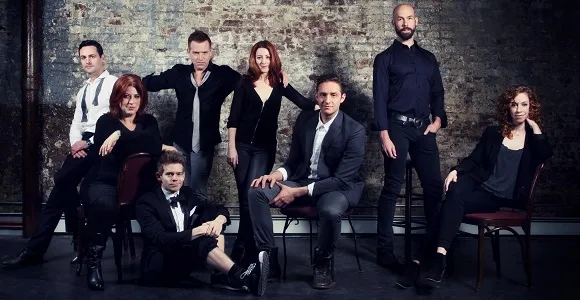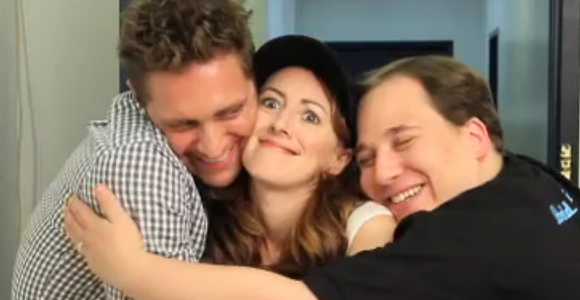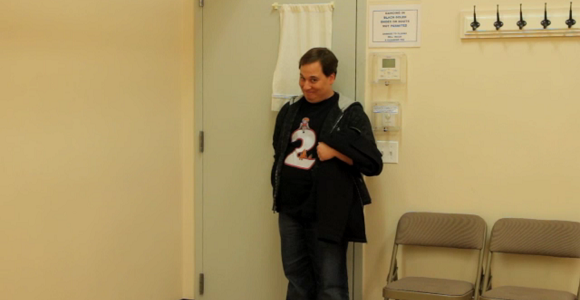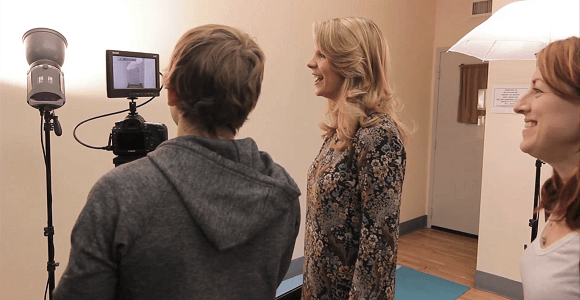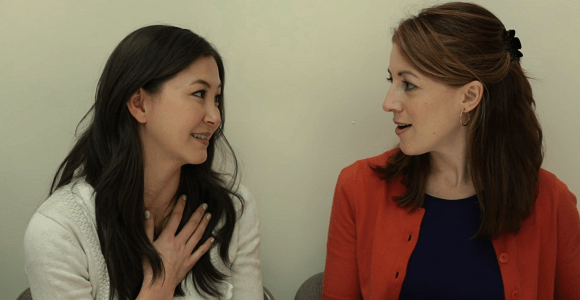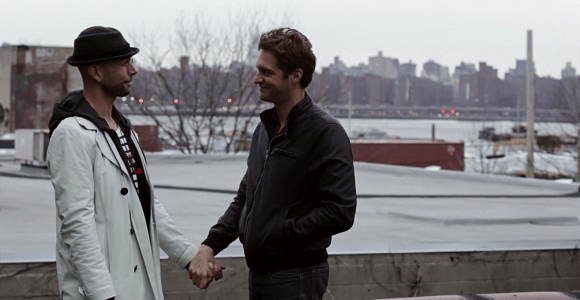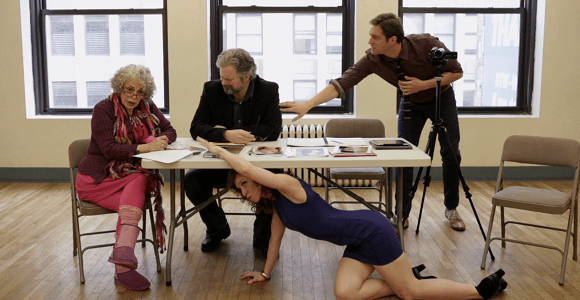As a platform, YouTube has opened up new opportunities for filmmakers, writers, pop culture critics, and other creative talents to share their work with the world. In this new series Ladies of YouTube, I sit down with writers, camera women, and prominent personalities to discuss their work as well as the advantages and disadvantages of YouTube culture.
Submissions Only is a comedy web series about the ups and downs of Broadway theatre life and the worst part of being an actor: auditioning. When the first season premiered, Kate Wetherhead was juggling duties as the show’s writer, director, and star character Penny as well as producing with her co-creator Andrew Keenan-Bolger. In its third season this year, Submissions Only has grown in scope as well as popularity, having been featured on NPR and Entertainment Weekly’s “Must List” to only name a few, and bringing in guest stars like six-time Tony winner Audra McDonald, Joel Grey, and Kimiko Glenn (Brook Soso from Orange is the New Black).
Submissions Only recently wrapped up its third season. Appropriately enough, the season finale went live online on June 8th, just after the 2014 Tony Awards, and Kate sat down with The Mary Sue to discuss the journey of her sweetly neurotic Penny Reilly, how West Side Story got her hooked on theatre, and how her career led to this quirky little love letter to Broadway.
Rachel Kolb (TMS): Are you originally from New York, or did you move out here?
Kate Wetherhead (KW): No, I’m from Vermont. Burlington, Vermont. I was there for my whole childhood and went to Wesleyan University in Middletown, Connecticut for undergrad. Originally, I thought I would double-major in English and Theatre. Then my second semester as a junior, I was studying abroad in Bali, and I was corresponding with the theatre department, finding out just how much I had to do to complete the theatre major and none of it interested me. An impartial observer, another girl in the program was like, “Why don’t you not major in theatre? You’re already majoring in English, why not just do that?” Sometimes that’s all you need to hear, someone say something really sane. “Oh my god, that’s a brilliant idea!”
I came back, stuck with the English major, and did a ton of theatre my senior year, mostly student productions. There was a very vibrant student production community. And then, I went to Circle in the Square theatre school after I graduated for two years, since that was the training that interested me more at that time than the requirements of my liberal arts program. Not to knock it, but I sort of had a feeling of what I was pointed towards, and it felt like my time was better spent. Also, there were some really cool English classes that I would have preferred to take. I was just like, this is the time to read a lot of cool books, and I’m going to do theatre for the rest of my life, so let’s take advantage of the educational opportunities while I have them.
Circle in the Square is what brought me to New York, and that was the way to go for me because I’m inherently cautious. Not shy in that I’m shy socially, but cautious is a better word. The idea of just coming here and trying to form a career is really daunting whereas coming here with a schedule and a place to go every day and a group of people to get to know was more in line with my personality and my approach to things. It made it less scary knowing that there was going to be a built in structure to my time. Even so, it was a nightmare. Your first year in New York, unless you have a lot of money, is really terrifying, so even though I had a place to go every day and I had new friends, I still cried a lot and called my mom a lot and panicked. But that which does not kill us!
TMS: Agreed! So with your English degree, did you always think you wanted to do more writing for theatre, or was it always acting for you?
KW: As a child, I discovered acting when I was about six, and I discovered writing when I was about seven. Throughout my childhood, up until middle school, I always imagined I would be an actress and writer. The writing aspect fell by the wayside. My guess is that I hit puberty. I can’t make any scientific connection, I can only not the timeline that my creativity I think was supplanted by social anxiety and insecurity and hormones and all of these things that distract you.
For whatever reason, acting was something that I was still really, really passionate about, and I kept up with my singing lessons and my summer day camps and went into high school with every intention of doing all the plays. And I was still a good writer in that I wrote good papers, expository writing. I won a few contests, and so it was something that was always recognized as a strength of mine, but it’s not like I went home and indulged in creative pursuits. That time was spent on stage or in lessons. When I came to New York, I was going to be an actor. That’s the dream.
TMS: What was it exactly when you were younger that pushed you towards theatre? I talk to people, and they say that they saw a show or were in a show, or their parents were in theatre. What was it for you?
KW: I went to see West Side Story when I was six. While it was not the first play I had ever seen, it was the first show that flipped the switch for me. I had seen Peter Pan, the national tour with Sandy Duncan in Boston, when I was about four, and I think I was still too young to be able to understand what I was seeing. About half of me understood that these were people pretending to be other people, and the other half of me wanted so desperately to believe that was actually Peter Pan and Wendy, so I wasn’t able to appreciate it as an art form because I was surrendering disbelief. But with West Side Story, I was able to understand that they were human beings pretending to do something, and I was mesmerized. It’s funny, I was six, and I’m sure there was so much that went right over my head, but that score and the dancing… this was a community theatre production. If I got in a time machine and went to see it, I would probably be laughing hysterically at these white people pretending to be Puerto Ricans, and who knows what that production was actually like!
But to me, it was the most magical thing I had ever seen. That was it, and from that point on, I couldn’t get enough. Anything that I could have access to, whether it be like an after school program with parks and recreation or a summer day camp. It’s interesting, you know, because I grew up in Vermont which isn’t necessarily a place associated with a vibrant theatrical community, and yet I kept pretty busy and had some pretty unique opportunities. For years, Burlington was host to the Champlain Shakespeare Festival at the University of Vermont. When I was eight years old, the theatre department at UVM was putting on a production of Cat on a Hot Tin Roof, and they needed No-Neck Monsters. There was an ad in the paper, so my parents shared it with me and I said, “Sure, let’s go.” So I was a No-Neck Monster in Cat on a Hot Tin Roof when I was eight, and then the following spring, I was cast as one of Medea’s sons. Immediately following that in the summer, I was in The Miracle Worker. Not as Helen Keller, but because they had summer interns from the undergraduate program, they wrote a little scene in for blind girls, and they let me be one of the little blind girls.
While these were all little, tiny parts, I was getting a lot of time with college students, and then at the Shakespeare festival, Equity actors who would come up from the city to do these shows. While I had the after school programs with my peers, I’m also getting a taste of something a little more mature, college level and then professional level. Certainly I was the only kid, so everyone I spoke to was older than me, and I don’t know exactly how, but I do know that it shaped me having that kind of time and being treated with that kind of respect by these people who could have ignored me if they wanted to. It was not their job, they weren’t being paid to babysit me, but they were really kind and I made friends. They also offered me a little glimpse into what that life was like.
TMS: Let’s move on to your writing for Submissions Only. You write the show and also play Penny, the show’s central character. How much of Penny is from your own experiences, and where exactly did that character come from?
KW: There is a lot of Penny in me. Penny was originally born from my desire to showcase myself as a viable on-camera actress, and that was really the way it started was, “Boy, wouldn’t it be nice to go in for more on-camera auditions? I wish people saw me in a certain way, and right now they don’t, so how can I demonstrate what kind of characters work on me?” It really came out of that initially, just that I’m a little bit silly, a little bit quirky, I can do neurotic. These are things that I think are qualities I can embody with some success, and also because both Andrew and I were very conscientious about making a show about our business that didn’t come across as bitter or like we had some axe to grind.
We wanted to be very careful about the statements we were making about the business, so she couldn’t be angry. She could be challenged, she could be frustrated, but she was not some bitter, dark, angry person. She also couldn’t be too successful because we thought, well, you know, we’ve got to have some stories to tell, and if everything is going fine, we have nothing to say. She has to fall on her face a lot, so what makes a person do that? Someone who self-sabotages, somebody who over-thinks things, somebody who is afraid, so to take those qualities and to take those characteristics came from a practical standpoint of storytelling, what will make this interesting for us and the audience, and tapping into those things did come from me. I was able to look at my own life and ask when did I do that or how can I make this personal so that she’s vivid and relatable.
To me, a lot of Penny’s qualities are qualities that I possessed in my twenties. I don’t necessarily think Penny is in her twenties but sort of an emotional maturity, she’s more in her mid to late twenties. Someone who has not given themselves permission to own her strengths and her gifts. I feel like a lot of people, myself included, sort of spend their twenties negotiating and apologizing for themselves or punishing yourself for not doing the things you think you should be doing. Something happens in your thirties where you can let go of that nonsense. Not to say that all insecurity goes away, it doesn’t, or your neuroses, but they somehow come into sharper focus, so Penny hasn’t reached that point.
TMS: That’s something I love about season 2 and season 3 is that Penny has these certain characteristics that start to become not so much endearing, especially her self-sabotaging and almost giving up the audition just because of a personal thing. I thought it was fantastic, the conversation with Steven where he says basically, “I don’t know what to do with you right now!”
KW: Right, right, and again, I can’t point to something in my actual life where that happened. I never, ever used a personal issue as an excuse not to go to an audition, but I’ve come up with lots of other excuses not to go to an audition. I’ve done that like crazy, so again, I think the keyword is the exaggeration. It’s not autobiographical. It’s sort of cherry-picking aspects of myself and going, “Let’s flesh this out a little bit more for this character.” She’s meant to be frustrating, you know? She’s meant to frustrate the people around her and the audience. You root for her, and you want to punch her a little.
TMS: As far as what you said about the show’s positivity towards the theatre community, that attitude entirely comes through in the character of Randall in season 2. I have to ask, where did you find those shirts? Those are amazing!
KW: Yeah! Well, when Jared Gertner first came on board, it was part of the conversation about who is this guy and I said, “I think he always has a show shirt on,” and then it became this fun challenge. He sort of took it on himself, “I will find them!” He would ask people, and once people started to see him on the show, we would get calls like, “I’ve got an Annie 2 t-shirt.”
TMS: Okay, the Annie 2 t-shirt, I have it in my notes to ask you about this because…okay, I saw that t-shirt, and you know in movies when you have a flashback or a repressed memory? I saw a production of Annie 2 at a dinner theatre in Iowa, and I don’t know how young I was, and I thought maybe I had imagined it? Maybe it was some weird fever dream? This is really a thing!
KW: Oh yeah, it’s a real thing. They have a t-shirt to prove it! Now Randall is… I love Randall so much, and yeah, he sort of represents all the wonder, all the love, all the faith in what we do, and I thought he was such a great foil for Gail and for Tim, just this beacon of positivity all the time. So aspirational, so optimistic, and also iconic. There are lots of Randalls out there too. I try to create characters that we all sort of know, and he’s not based on any one person, and a lot of these people are combinations of other people.
TMS: And it’s hard to imagine some of the growth that Gail goes through, especially in season 3, without the influence of Randall. Again, it’s just fantastic.
KW: It had to have been absorbed somewhere. Her storyline is my favorite. That was the one that was most exciting to write and the most gratifying. It’s one of those things where I was just so glad we got a third season because she wasn’t ready to grow until this point. Lindsay Nicole Chambers also is just too good of an actress not to give that kind of story to.
TMS: What you were saying earlier about giving yourself permission to own your gifts, that’s kind of Gail in that season!
KW: Yeah, right, right!
TMS: Changing topics for a moment, Submissions Only has grown considerably since season 1. Can you talk about how your role behind the camera has changed since the first season?
KW: Yeah, sure, sure. The first season, Andrew and my roles defined themselves pretty quickly and stayed pretty consistent throughout all three seasons. Andrew is the one who has the technical side, who is not only proficient at operating a camera but wants to whereas I have no real interest in that. So he was always comfortable behind the camera lining up the shot, focusing the shot, and also aside from that, he would read books about filmmaking or he would do online tutorials that he wouldn’t even necessarily tell me about. It was more of an afterthought, so he was growing as a filmmaker.
I was more comfortable and more excited about directing the actors. “This is what is going on in this scene.” “I need more urgency here.” “I need you to say this line faster or throw this line away more.” Also, having written most of them, I know what it is supposed to sound like, so we fell into our designated roles really well. When it came to me, when I was on-camera, Andrew would definitely pay closer attention because he knew I needed him to be watching. First season in terms of the hats we were wearing, we were also producing ourselves, and scheduling everything and the wardrobe and we did everything. We had some PAs (production assistants) which we acquired through Andrew’s Twitter blasts. We would tweet, “Hey, is anyone free tomorrow from 2-4? Come meet us at this place.” So random kids would show up, and we didn’t even have a lighting kit at that point. Aside from that, the whole thing was ours, and it was a lot. We learned just how much we had bitten off by producing. That’s the part you don’t think about. You think, “I’m a creative person, and I’m going to make something.” And then you look at location scouting and scheduling and all of that stuff.
Second season got a little bit better. One of our PAs really had shown initiative, and so we promoted him to a quasi-line producer and gave him scheduling responsibility and we have sort of a rotation of PAs, some of the same people from season 1. The third season took so many major steps forward, so we had ten PAs in rotation that had been interviewed. We had a lot of people on board in comparison to the first two seasons which allowed Andrew and myself to really focus on the things we are actually good at. Unlike the first and second seasons where at any given time we are filming, writing, editing, and producing, the third season felt much more organized. We had a pre-production, we shot for 10 weeks, and then the post-production began. I think we had four episodes written before we started, and then I had to write four more while we were filming. My hope had been to have them all done, but it was impossible. I learned stuff from my actors on-set, so I feel like the scripts actually gained something from me working on the episodes leading up to it, in a way. We went from doing everything to getting better at delegating.
TMS: The thing that is unique about Submissions Only compared to some of the other Ladies of YouTube interviews is the scope of the production. This show has the most people involved and getting it done. Most YouTubers are one-man or one-woman productions, like Hannah Hart or Lindsay Ellis. Submissions Only has obviously grown since the first season.
KW: Yeah, it got very ambitious.
TMS: And with season 2, the show moved from YouTube to Broadway World.
KW: We partnered up with Broadway World and then continued with them for season 3. At first, season 2 was exclusively on Broadway World, but the deal was that eventually we could put them on YouTube as well. So now seasons 1 and 2 exist on Broadway World and YouTube, and season 3 will eventually be on YouTube as well, maybe in a year.
TMS: I was curious about with your partnership, what are some of the advantages and disadvantages of being on Broadway World instead of YouTube?
KW: Well, the advantages are that we share an audience with them, and they are the most visited theatre site, so we knew we were going to be gaining audience members through them, and it just felt like a good home for us. The subject matter is so in line with their content. The disadvantages are that non-theatre people have found us on YouTube who aren’t necessarily interested in Broadway World and just for whatever reason dug our show and liked that they could go to YouTube. I think a lot of them still followed us.
What you give up is the possibility of someone happening upon our show on YouTube since it’s like this rabbit hole of content. You start, and then all of a sudden, there are all these options on the side of your screen. In that sense, Submissions Only might show up on that bar, and suddenly you’ve found a new thing that you like. With the first few seasons on there, it’s possible that they might click on it and find us. Yes, there are pros and cons, but it helped with the narrative of who we were and helped brand the show and helped it feel like ours, you know, the theatre community. The theatre community has also been so receptive because we have cast so many people, so the people who watch the show say, “I know everybody in it!” There’s something in it for everybody.
TMS: I don’t know if you’re aware of the show Husbands, but it is an online series written by Brad Bell and Jane Espenson of Buffy the Vampire Slayer. The show was created for YouTube originally, but it was picked up by CW’s online outlet, CW Seed. I got the chance to talk to Jane last year about the show, and she believes that online shows should be considered television as much as network or cable TV. Do you share this belief about Submissions Only, or do you think online programming is becoming its own new outlet, independent of the rest?
KW: I can only speak to Submissions Only, which I always thought of as a TV show because that’s what I wanted to write. I just didn’t have any connections to the TV world, so I put it on the web. Of course it’s a web series, but we never thought about doing five-minute videos. It was always going to be close to sitcom length because that’s what we were interested in doing.
TMS: You didn’t feel bound by a certain format or structuring it a certain way, even though it was distributed online.
KW: It was interesting, we were in our first season, and we started to talk to people because we started to get great feedback. We thought, “Okay, what’s the next move? Should we do something with this?” One of the first conversations we had with people was about shortening it or breaking it up into five-minute segments. We sort of nodded and said, “We understand why you’re saying that, but it’s not really what we’re interested in doing.” Cut to like two years later, all of a sudden House of Cards, Orange is the New Black –
TMS: Yes, Orange is the New Black! I re-watched the season 3 finale of Submissions Only last night, and –
KW: Brook Soso!
TMS: She was in the season 3 finale! I couldn’t believe it, my mind was blown! I had been watching the first couple episodes of the new season of Orange is the New Black, and I thought she looked so familiar.
KW: Obviously when we shot it, I don’t even think Kimiko knew, so the timing of that worked out really well. Somehow, we were unwittingly ahead of the curve on that one. “People don’t want to sit in front of their computers for that long!” Well, okay, but…okay!
TMS: That attitude has clearly changed.
KW: This is the story we want to tell, and this is how we want to tell it! Let’s see what happens, and fortunately now, it’s no big deal to watch 22 minutes or 52 minutes on your computer.
TMS: And with a show like Submissions Only or Husbands… are you familiar with the premise of Husbands? Basically, the premise is that gay marriage has just been legalized across the United States, and a gay celebrity couple go out to Vegas to celebrate. They’ve only been dating a couple of weeks, but they get drunk and get married, and now they’re trying to make the decision of being the first major couple to get divorced after this law has passed or try to make their marriage work.
KW: Oh, that’s great.
TMS: Yeah, it’s an excellent show, but what is wonderful about Husbands is that it has this central gay couple that is very different from most gay couples on TV. TV seems really weird when it comes to gay couples, that they have to fit in these very specific boxes.
KW: Yeah, that’s something I’ve been aggressively intent about capturing a real portraying of honest gay relationships because that’s what I’m exposed to, especially in this community where homosexuality has been the status quo for a really, really long time. While the cultural trend is definitely shifting, it has not been a big deal in our community for, well, forever! It was important to me that these characters be characters and not Gay Characters. What makes them unique or makes them flawed or what makes them charming has nothing to do with their sexuality and everything to do with circumstance and how they relate to other people.
TMS: The issues in their relationship have nothing to do with their sexuality.
KW: It’s not political. I wanted to keep that out of it. A, because it didn’t interest me, and B, because I think it is actually more political not to do it. I think the strongest political statement to make is not make a statement. These are pretty normal people, they are falling in love, isn’t that nice? Remember how that feels?
TMS: That’s why I love Nolan and Tim so much because they are such an odd coupling. They are such complete opposites personality-wise, and that is the central issue in their relationship, that Tim is having trouble defining what it is and Nolan doesn’t care to necessarily define it.
KW: Right, and again, the sexuality did not come into play, it was the fact that he is just so different. Like Penny, he is conscious about that stuff. If Wade McCollum had not been on tour with Priscilla, Queen of the Desert, I think we would have explored it a little more, but linguistically, we didn’t have that luxury. If he had been around, I think I would have explored a little bit more like what exactly was going on with Tim that made it scary. Aside from Nolan being Nolan, Tim has serious commitment issues and isn’t necessarily interested in exploring his emotional landscape as much as his professional one.
TMS: That’s the thing I also enjoyed about Nolan’s character, the fact that when you first meet him and see his Compass-ition video, it seems like this will be a joke character, but he’s really very earnest in the same way that Randall is, about theatre and about what he does. With the audition sequence, his method might not work for everyone, but it might work for one person.
KW: Right, and that’s who he is interested in working with. I think it is fun to surprise people with, you’re not going to take this person seriously, but then you are going to take this person seriously. And then you contrast with someone like Vincent Savio who does sort of talk for the sake of talking. Nolan believes everything he says, and Vincent is a bit up his own ass who happens to strike gold every once in a while. He is a fraud with really good luck. Really bad luck too, but again, Vincent exists as well. These people who every so often do something, and you go, “That’s amazing,” and then the next thing they do, you go, “They have no talent! Ahh, the emperor has no clothes!” And then a year later, they will put something else up, and you go, “Oh, no, no, he is a genius! She is a genius!” And you never really know, you can never tell.
One of my favorite lines is when Vincent Savio is first meeting Tim, and he says, “When I heard you worked with Nolan, I was like, right on, because he and I share a lot of the same vibe…” and Tim and Gail together are looking at each other like, “Uh, no…not at all!” Yeah, Nolan was always meant to be sort of this slow burn character.
TMS: Another question I had was about the audition scenes. How many of these auditions are based on real experiences that you guys had?
KW: Well…actually, a few, and again, they are sort of exaggerated versions. For example, the episode with the little girl where she has the breakdown –
TMS: I was just going to ask about it!
KW: That happened to Andrew. He wasn’t a kid, but he had to have this really emotional breakdown for an on-camera audition. He did the whole thing, and they were like, “I’m sorry, can we do it again? The tape ran out.” So we take that, that’s hilarious, but then you think for our show, how do we make it the most absurd? And it’s funny if it’s like, a child because that’s like so vulnerable. How dare you make a child do that again? I mean, an actor, “Sorry, them’s the breaks,” but to make a little girl do it would be funny. And then again, we didn’t make it an on-camera audition because Tim doesn’t really do that yet, so we said it would be one of those things where the director is not at the audition, just little things to make it plausible.
TMS: The physical comedy in that scene with Gail crawling on the floor, trying to get the tapes, the situation lends itself very well to comedy.
KW: And we asked ourselves, “How can we make this even sillier?” Put Gail on her knees, crawling. The audition where the two people are arguing about the guy who has just auditioned and finished his song, one wants him to come to a callback, and the other doesn’t. That is taken from my friend Joel Ferrell, who is the associate artistic director at the Dallas Theater Center where I’ve worked a bunch of times. When he was new to New York, he came in for an audition and witnessed the music director and choreographer just fighting about him while he was in the room. Someone said they did know a woman whose water broke during her audition. The reason why we did that was because I had a friend who was pregnant, and I thought, “Well, that will be funny.”
Oh, and the guy who was sick! They always say to never say you are sick at an audition. Never say it. No one wants to know that you are sick, and I thought, “Well, wouldn’t it be funny if it was so obvious that this person should go to the emergency room but he would refuse to acknowledge it?” Some of the things we were doing unwittingly turned out to be true stories. Usually we look at who is coming in and what would be funny for them.
TMS: Like Audra McDonald asking all the wrong questions!
KW: Yes, all the wrong questions! My foot is so deeply lodged in my throat. Really, auditioning is like the worst thing in the world. It really is.
TMS: I think it’s time to wrap this up with one last question. If Submissions Only started a trend of behind-the-scenes comedies about Broadway culture, what kind of stories would you like to see told?
KW: Having been an understudy on Broadway, I always thought a sitcom about understudies would be kind of hilarious/fascinating/heartbreaking/inspiring. Also the weird survival jobs that people take while they’re pursuing their acting careers. Waiting tables and temping really only scratch the surface. I also kind of want there to be a Submissions Only spin-off based on Judith Light’s character, Sharon Duvall.
Kate Wetherhead can be seen in Submissions Only, which recently finished its third season. Watch all three seasons at Broadway World or the first two seasons on YouTube. She can also be found on Twitter @katewetherhead.
Rachel Kolb is a Disney fangirl, Swan Queen shipper, and life-long Broadway nerd with an encyclopedic knowledge of original Broadway cast recordings. She is currently a staff writer at JustPressPlay.net and a contributor to Sound on Sight. She is also the creator of LudusNYC.com, a website celebrating Broadway theater that offers tips on making theater-going more affordable. Since the fall of 2013 she has been a regular co-host on The Disney Film Project podcast, a show dedicated to reviewing every film released by the Walt Disney Company, from the classic animated features to Pixar and LucasFilm. She can be found on Twitter @rachelekolb and @LudusNYC.



